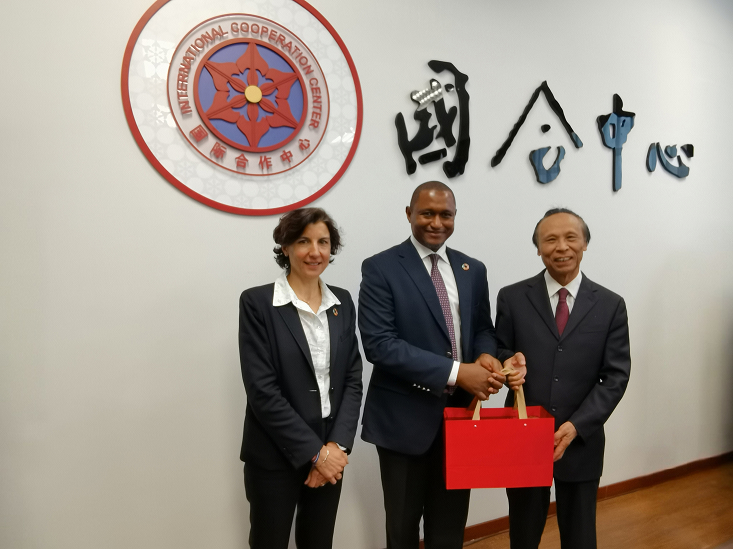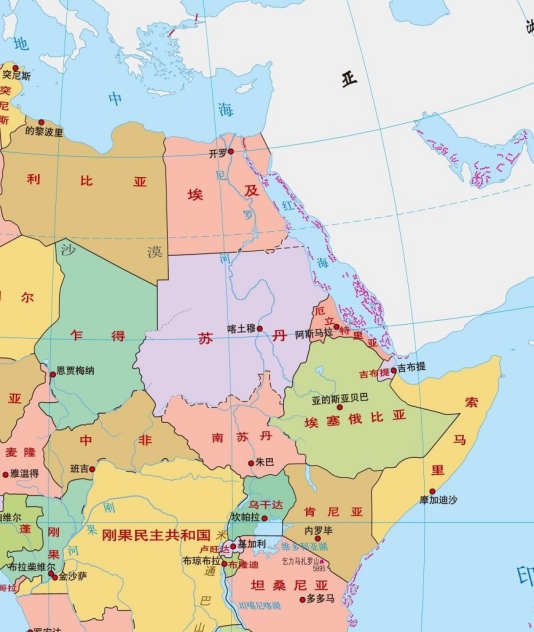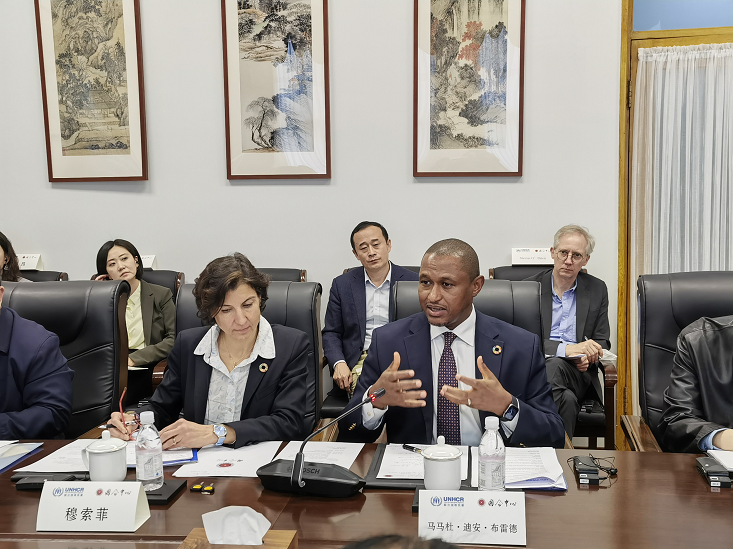The Symposium on the Humanitarian Situation in Africa and China-Africa Cooperation was held in Beijing
On 21 April 2025, the International Cooperation Center (ICC) and the UNHCR Representative Office in China held a symposium on "the Humanitarian Situation in Africa and China-Africa Cooperation" in Beijing. Both sides had an in-depth exchange of views on the humanitarian situation in Africa, especially in East Africa, the Horn of Africa and the Great Lakes region. In addition, cooperations between the UNHCR and the Chinese government, enterprises and public institutions are also being discussed. Zhang Chongqing, member of the Strategic Advisory Committee of the ICC Joint Council and honorary president of the China Group Companies Association (CGCA), Zhang Yu, the convener of the Joint Meeting and director of the Steering Committee of the ICC, met with Mamadou Dian Balde, the UNHCR director for the regional Bureau of the East, Horn of Africa, and the Great Lakes, Sophie Muller, the representative of the UNHCR in China, and other members of the UNHCR at the Jianguomen office of the ICC.

Sophie Muller(left) Mamadou Dian Balde(middle) Zhang Chongqing(right)
Zhang Chongqing stated that the Ambassador Fu Cong, the Permanent Representative of China to the United Nations, mentioned at the public meeting of the UN Security Council on the issue of the Great Lakes Region in Africa on April 16 that recently due to the continuous offensive of the "March 23 Movement". There has been continuous fighting in the eastern part of the Democratic Republic of the Congo (DRC), and the entire Great Lakes region has fallen into turmoil. The international community must work together and cooperate closely to reverse this dangerous trend as soon as possible. The leaders of the East African Community (EAC) and the Southern African Development Community (SADC) recently held two joint summits successively to formulate a road-map for resolving the issue in the eastern DRC and establish a "coordinator's group". Qatar has pushed for a trilateral meeting between the leaders of the DRC and Rwanda in Doha, and the DRC government has made direct contact with the "March 23 Movement". These are all encouraging positive developments. China hopes that the two sides in eastern DRC and Rwanda will sincerely respond to the mediation efforts of regional and international partners, resolve each other's security concerns through dialogue, and reach a lasting peace plan as soon as possible. The ICC will continue to call for and promote the international community to support the African way of resolving African issues, and call on the African Union, the EAC, the SADC as well as the external partners to strengthen mutual coordination.
The recent two years of warfare have left Sudan facing the most severe humanitarian and displacement crises in the world today. According to data from the UNHCR, approximately 30 million people across Sudan are in urgent need of humanitarian assistance, and nearly half of the population (about 25 million) are suffering from severe hunger. Balde delivered a keynote speech titled "Engaging China in humanitarian response and solutions in Eastern & Horn of Africa" at the symposium on that day. He pointed out that the refugee crisis caused by the armed conflict in Sudan has spilled over to neighboring countries such as South Sudan, Chad, and Uganda. These countries themselves are facing issues such as unstable situations and scarce resources. The influx of refugees has placed them under greater humanitarian pressure, posing greater risks to already fragile regional countries. Balde emphasized that the refugee issue is a global problem and urgently requires more support from the international community. 15 April 2025, marked the two-year anniversary of the armed conflict in Sudan, and the humanitarian situation in Sudan is particularly severe. The conflict has displaced nearly 13 million people in Sudan, making it the country with the largest number of refugees in Africa. The UNHCR called on Sudan and the Democratic Republic of the Congo to restore peace and stability as soon as possible. Finally UNHCR also called on all countries around the world to provide humanitarian assistance to refugees in the region.

the East, Horn of Africa, and the Great Lakes Region
The Horn of Africa is located in the northeastern part of Africa and the southern coast of the Gulf of Aden, connecting the three continents of Asia, Africa and Europe. It guards the Red Sea and holds a strategically important position globally. Currently, China is the largest investor in the Horn of Africa region. The Red Sea is an important transportation channel for China to export goods to Europe and import oil from the Middle East and Africa. The security governance in the Horn of Africa region is related to the security of the Horn of Africa and the African continent as a whole, as well as the safety of Chinese investments, enterprises and assets in Africa. As of mid-2024, the East Africa and the northeastern part of Ethiopia and the Great Lakes Region (EAHGL) have accommodated approximately 5.4 million refugees and asylum seekers, as well as 18.8 million internally displaced persons (IDPs). Millions of people fled conflicts in the Democratic Republic of the Congo, Somalia, South Sudan and Sudan. In 2024, the El Niño phenomenon triggered heavy rainfalls and severe floods that hit several countries in Africa, affecting hundreds of thousands of refugees, IDPs and local community members, leading to more displacement situations.
The meeting thinks that looking back over the past decade, the repeated outbreaks of conflicts in the Great Lakes region of Africa reflect that the deep-seated problems in the region have not been fundamentally resolved. The international community must adopt comprehensive measures to support the countries in the Great Lakes region in systematically addressing the root causes of security deficits, governance deficiencies, and unbalanced development. It is necessary to assist the regional countries in strengthening the management of natural resources and conducting mutually beneficial cooperation with the region, so that natural resources can truly become engines for promoting regional peace and development. The ICC has worked with the UNHCR to promote regional cooperation among all parties concerned, which collaborate with the Horn of Africa, Eastern Africa, and the Great Lakes , and made new contributions to promoting the lasting peace and prosperity of the Great Lakes region. Main recommendations: First, promote security governance in the Horn of Africa in global multilateral mechanisms such as the United Nations. Strongly call for the international community to pay active attention to African security issues and support the African Union and African countries in independently maintaining long-term stability on the African continent. Second, promote China's support for the African Union and sub-regional organizations in playing a leading role in conflict mediation, and use the Horn of Africa Peace Conference as a starting point to improve regional security mechanisms. Third, adopt comprehensive measures to address the root causes of conflicts and unrest. Promote peace through development cooperation and make the Horn of Africa a corner of peace, cooperation and win-win results. Support the countries in the Horn of Africa in taking the path of seeking security through development and promoting peace through development.

The delegation of the UNHCR attended the symposium
The meeting pointed out that the UNHCR was established by the UN General Assembly and is one of the UN's affiliated agencies. Its headquarters is located in Geneva and it has offices in 121 countries around the world. The UNHCR offices are entrusted by the UN to guide and coordinate international actions worldwide for the protection of refugees and the resolution of refugee issues. The ICC is a window for China to conduct external exchanges and international cooperation; moreover it is also a long-term strategic partner of the UN in China. The ICC has long been committed to the research of strategic issues such as world politics, world economy, multilateral affairs, and international peace studies. ICC is playing an important role in China's "1.5 track" diplomacy. ICC has established a long-term cooperation mechanism with the UNHCR, and the cooperation mainly focuses on areas such as humanitarian crisis early warning, refugee protection and assistance. Under the support of the national competent department, the consultation mechanism of cross-ministerial committees, ICC will leverage its advantages in forward-looking research and rich experience in responding to crises to strengthen communication and coordination with the UNHCR's representative office in China. It will also continue to promote cooperation goals, making contributions to promoting international humanitarian affairs, peace and development.
Several experts and scholars attended the symposium and delivered speeches successively, these include: Xie Pei, former executive deputy secretary of the Party Committee of the Export-Import Bank of China, Feng Yuping, former counselor of Beijing Municipal People’s Government, Shen Wei, vice president and secretary-general of the China Association of Port-of-Entry, Zhu Hongshan, former deputy general manager of the Strategic Development Department of China Communications Construction Company, and Yang Chaolun, former final reviewer of the International Department of Xinhua News Agency, as well as senior representatives from the CGCA, China National Petroleum Corporation (CNPC), China Communications Construction Company (CCCC), China North Industries Group Corporation (NORINCO), Beijing Grain and Oil Company, and Shengbaize Industrial Company.
Cheng Yu, executive secretary-general of the ICC, Zhang Bin, deputy director of Hong Kong, Macao, Taiwan and Overseas Chinese Working Committee at the ICC, Wu Zhonglin, executive director of the Development Committee at the ICC, Xin Shaosong, executive deputy director of the ICC’s Office, Li Gen, assistant secretary-general of the Bulk Commodity Service Branch of the China Association of Port-of-Entry; Steven O’Brien, Senior External Relations officer of the UNHCR in China, Meng Jun, Private Sector Partnership officer, Cui Lin, Associate External Relations officer, Li Ang, Associate Private Partnership and Philanthropy officer, and Cheng Fan, Associate Government Liaison, attended the symposium.

